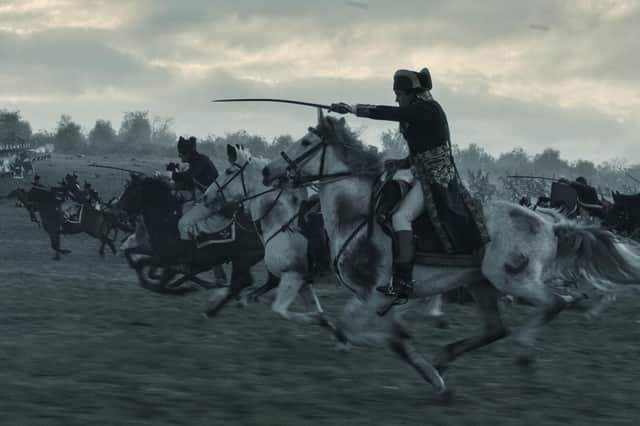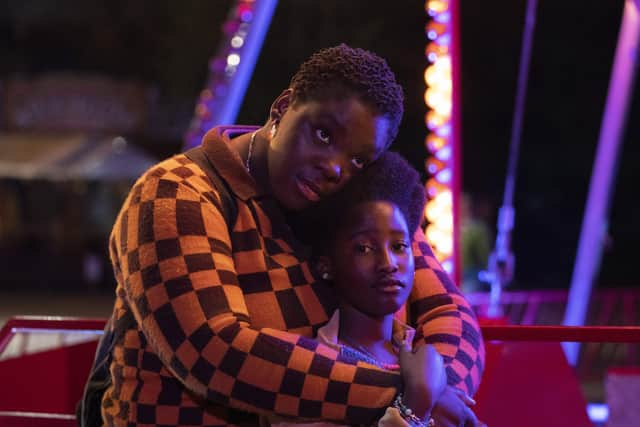Film reviews: Napoleon | Wish | The Eternal Daughter | Girl


Napoleon (15) ****
Wish (U) ***
The Eternal Daughter (12A) ****
Girl (15) ****
There’s a neat synchronicity between Ridley Scott’s first film and his latest. Released in 1977, The Duellists explored the tumult of the Napoleonic Wars in microcosm via an increasingly petty and pointless rivalry between two French officers sporadically fighting each other over the course of 16 years for reasons neither can remember. Forty-six years on, Scott now gives us the macro version. Napoleon is his huge biopic of the imperial tyrant, whose willingness to sacrifice millions of men in his own vainglorious lust for power is rendered with all the epic grandeur you’d expect, but is also transformed into this film’s tragic punchline courtesy of a wry final scene that’s too good to spoil in a review.
Starring Joaquin Phoenix in the title role, the film kicks off with the execution of Marie Antoinette and charges full speed ahead through Napoleon’s rise to power in the early days of the French Revolution, when his talent for military strategy helped defeat the British naval blockade at Toulon. This is the first of several spectacularly staged set-pieces, but it’s also one in which Scott slyly seeds a possible source of Napoleon’s virulent hatred of the British: in a little nod to Alien, Napoleon’s beloved horse experiences a reverse chestburster mid-battle courtesy of a cannonball exploding its insides. It’s the only time we see Napoleon grieve on the battlefield.
Advertisement
Hide AdOff the battlefield, though, there’s plenty of grief, mostly regarding his strange, twisted, almost kinky relationship with his soon-to-be empress Joséphine (Vanessa Kirby), a punky looking widower who both loves him and cuckolds him. Unable to conceive a child, their marriage has all the characteristics of a duel, each damaging the other a little more as time goes on, but unable to live without the other either. Here, Phoenix gives a wildly entertaining performance, playing Napoleon like a sneering, leering cross between a petulant child and a rutting terrier, something that brings to mind both his turn as the incestuously inclined emperor Commodus in Scott’s earlier Gladiator and his off-kilter incel psycho in Joker. Kirby’s more than a match for him, her Joséphine taunting Napoleon when they’re together and haunting him when they’re not.


As for Scott, the 86-year-old maverick is on dazzling form, be it the way he takes creative licence with early campaigns (at one point he has Napoleon fire on the Pyramids) or the precision with which he recreates Napoleon’s tactical victory at Austerlitz. And while it would also be easy to criticise Scott for never humanising the frontline cannon fodder, that’s missing the point. He understands the irony of making a spectacle out of such carnage, but we’re seeing this from Napoleon’s perspective; his disregard for human life reinforces the hollowness of his perceived victories and ultimately brings about his fall. This may be blockbuster filmmaking on an epic scale, but that doesn’t mean it’s devoid of subtlety.
Disney’s latest film Wish tries to harness the magic of the studio’s back catalogue for a generation weaned on contemporary mega-hit Frozen. Sadly it comes up a little short; its convoluted story – about a magical kingdom where people’s wishes are controlled by a power hungry sorcerer called Magnifico – really just an excuse to pay tribute to the legacy of Disney in its centenary year. That said, this greatest hits package is not unentertaining, with Ariane DeBose in fine voice as the otherwise underwritten heroine, Asha, and Chris Pine good value as the villain. A mercifully brief running time also ensures it doesn’t outstay its welcome.
Following up her brilliant two-part film The Souvenir, Joanna Hogg returns with The Eternal Daughter, an intriguing sequel of sorts that continues its characters’ journeys in real time. It stars Tilda Swinton, who doesn’t just revive her role as Rosalind, the quietly funny mother to The Souvenir’s aspiring filmmaker protagonist, Julie Hart, but also plays Julie herself, who’s now in middle age and confronting her complicated relationship with Rosalind as she starts work on a new film (Swinton’s real daughter, Honor Swinton Byrne, played Julie in both Souvenir films). Although this makes it sound tricksy, the casting conceit quickly becomes a playful, moving and eerie way to tap into the ghostlier aspects of the film, which is set in a supposedly haunted country house in the run-up to Christmas. Julie has taken Rosalind there as a birthday treat because she used to stay there when she was a girl, but she soon starts to question her decision, worrying that the memories will be too much for Rosalind – and perhaps herself. Hogg gently turns the screws of gothic horror to her advantage here, expertly teasing out the complexities of parent-child relationships and the hold they continue to exert.
A complicated mother-daughter relationship is also at the heart of Girl, writer/director Adura Onashile’s assured debut. Set in Glasgow, the film explores in subtle and delicate ways how the outside world gradually encroaches on the protective bubble a young immigrant mother (French actor Déborah Lukumuena) has constructed for her daughter (Le'Shantey Bonsu) as a way of coping with a trauma from her own past. The details of that trauma are never explicitly stated but we quickly get a sense of it through Onashile’s judicious use of dreamy flashbacks and Lukumuena’s nuanced performance as the hostile-to-everyone Grace. Onashile’s ability to find visually arresting ways to keep us in her characters’ heads, meanwhile, gives the film a lyrical quality that helps it transcend some tough themes.
Napoleon is in cinemas from 22 November. Wish, The Eternal Daughter and Girl are in cinemas from 24 November.